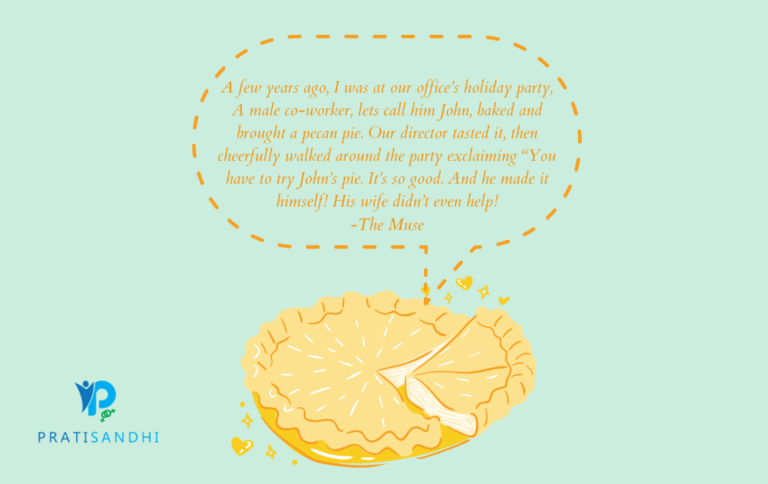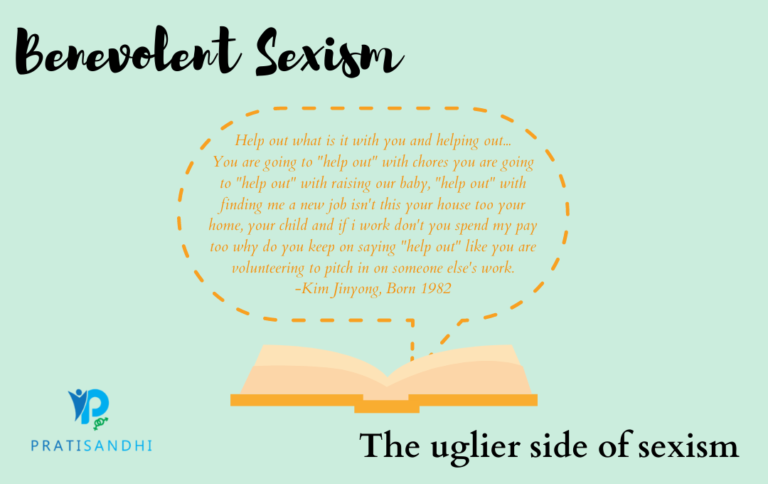Benevolent Sexism
Written by- Aadya Gupta and Nandini Shukl
The Uglier Side of Sexism
Sexism has two sides, the hostile and well recognized, which consists of denying women access to areas deemed ‘important’, and the other (falsely) benevolent, which involves praising their skills in traditionally feminine and undervalued tasks. These two sides combine to form ambivalent sexism. According to scientists Susan Fiske and Peter Glick:
Hostile sexism is very easy to recognize. This old-fashioned discrimination is considered gauche these days, because it’s not very socially acceptable anymore to tell a woman that she can’t do a job simply because she happens to be a female. However, Benevolent sexism is similarly insidious and dangerous, because most women don’t know how to guard against it. Our budding feminist sensibilities confuse such comments with praise.
What is the difference between hostile and benevolent sexism?
Hostile sexism is antipathy toward women who are viewed as usurping men’s power. It is visible and aggressive. However, benevolent sexism means what while women are placed on a pedestal and lauded for their supposedly feminine qualities, they’re thought of as incompetent in other areas. So, this is a subjectively favorable, chivalrous ideology that offers protection and affection to women who embrace conventional roles of womanhood.
A serious, qualified working female professional will disproportionately be granted work such as ‘schmoozing at a party; or ‘handling PR’, because she is more ‘likeable’ and ‘easy on the eyes’, as compared to her male co-workers. Administrative work and reminders are also delegated to women. Men, on the other hand, might view it as ‘taking work off of her hands’ so she isn’t overburdened with work, so they can do the ‘real’ work. Have they stopped to consider she might want and deserve the additional responsibility? Or actually does it better than them? The horror!

Have you ever heard these sentences?
- Women are more nurturing than men.
- Women are more compassionate.
- Women are kind and men are strong.
- Women are neater.
And, my personal favorite,
5. Girls are more organised than boys.
I have always been an organized child. I was a diligent student, and my notebooks were color-coordinated with highlighters and immaculate notes. I was praised for my neat work, and at the same time, the boys in my class were negatively compared with the prim and proper, neat and tidy girls for their bad handwriting, general untidiness and scruffy school uniforms. Then came group projects: The first project I did, I worked with a boy and we did equal sections in the poster we had to make. The end result was messier than I would have liked, but a good submission all the same. I was chastised for letting it become so messy and unpresentable. Subsequently, I would hate having boys in my group, because I thought of them as uncoordinated. I took a greater share of work on myself than required, because I wanted our work to look neat, and I thought they couldn’t do it. When praise was given to all, the teacher would acknowledge my work and smile. I took pride in creating good work. But at the same time, I was expected to do it. The boys sat back and let me do the work, for I wasn’t happy with their work, and they didn’t bother to put in enough effort anyway. The teacher never corrected them. It is as if for them, sloppiness was expected, and unacceptable coming from me. But the teacher was the boys’ strongest supporter when cheering for them on the football field. You will be shocked by the number of times you have subconsciously done , or refrained from doing something, because of these expectations that men and women both place on women’s behavior.
Where does this come from?
Benevolent sexism stems from enforcing traditional, stereotypical gender roles on both men and women, and praising them when these expectations are fulfilled. Women are ‘naturally’ more caring, while men are ‘naturally’ rational, less emotional, and physically tough. All these compliments will sound lovely, but they betray the views of the speaker.
Another great example of this is an article on The Muse’s website,

For us, entertainment sources show damsels in distress, attracted to toxic men like Kabir Singh and Kundan from Raanjhanaa. Since these men engage in destructive and abusive behavior with pride, their implicit sexist ideals are sold as redeeming points.
Why is it so problematic?
The subtle, invisible nature of Benevolent Sexism means that any dialogue surrounding it is dismissed almost immediately; or expected to be. When the stereotypical gender roles are rewarded in any space, it creates unfair expectations on people to embody them, in order to increase their desirability.
Internalized patriarchal attitudes seek to reinforce the position of women as domestic workers and home makers, whose best qualities would shine in jobs which consist of social interaction and people pleasing. If they do not wish to accept these roles for themselves, the high praises sung about how “women are nurturing” and other such stereotypes rejects anything that could be slightly different as anomic. It keeps women compliant by expecting them to react a certain way- positive reinforcement of wanted behavior.
In a binary, it reduces women’s work and worth to arbitrary, expected and often unrelated personality traits. They have to go the extra mile in order to not only accomplish what they have to do, but to do it with a pretty face and a beautiful smile. While reinforcing the power structure, it also dismisses the idea that men could have stereotypically feminised traits, or do stereotypically feminine work despite being a man. These ‘compliments’ strengthen our sexist ideals bit by bit.

What is the solution?
Benevolent sexism is often overlooked because more hostile and aggressive forms of sexism exist, like rape, dowry deaths, domestic abuse etc. We are expected to let the ‘little things’ go, since they’re more passive and unnoticeable. That does not mean this is any less insidious to a woman’s sense of self. When this pattern trickles down into every single interaction people have with their environment, it is a big deal. If anything, it needs to be safeguarded against even more, precisely because it strikes us without wounds.
Benevolent sexism is the societal monster that has been living in the shadows for years, and it’s time we rise up against it.
Author

